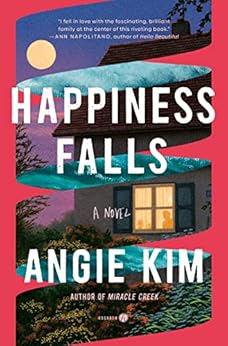4 Stars
I loved Angie Kim’s first novel, Miracle Creek (https://schatjesshelves.blogspot.com/2019/05/review-of-miracle-creek-by-angie-kim.html), so looked forward to her sophomore offering. I was not disappointed.
It is 2020 in the Virginia suburbs of Washington D.C. in the midst of the Covid pandemic. A man, Adam Parson, goes missing while on a walk with his 14-year-old son Eugene. A distressed Eugene returns home with blood on his clothes and hands, but he cannot tell what happened; he cannot speak because of autism and Angelman’s syndrome. The next 60 hours are detailed as the search for Adam continues. Was Eugene a witness to what happened to his father or is he somehow responsible? Did Adam commit suicide? Was there an accident? Was there foul play? Or did he intentionally abandon his family?
The narrator is Eugene’s older sister, 20-year-old Mia. She has a unique personality. Highly intelligent and hyperlexic, she is also over-analytical. She analyzes all events and everyone’s motives. As she openly admits, she tends to go off on tangents which will drive some readers to distraction. Helpfully, she puts side notes in footnotes which she tells her reader to skip if, like her twin brother John, a reader finds them annoying. I enjoyed the endnotes because they really capture her personality. I loved her sarcasm and really appreciated her honest admission of having conflicted emotions about having a special needs sibling.
The plot is intriguing. I found myself trying to figure out what happened by being as analytical as Mia. There is certainly sufficient suspense. Some of Adam’s secrets are revealed to complicate the investigation and then some videos emerge which seem to point to Eugene’s direct involvement in his father’s disappearance. The family must worry not only about their missing father/husband but also about Eugene’s being treated as a suspect. Covid serves to further isolate the family, and pandemic protocols impact events.
Part V of the novel is entitled “This is Not a Missing-Person Story” and that could serve as an apt subtitle for the entire book because it is so much more than just a mystery. For instance, it discusses how verbal eloquence is considered an indicator of intelligence: “we equate verbal skills, especially oral fluency, with intelligence.” Because Eugene cannot speak, he is treated like a child half his age. Mia also mentions not being able to speak Korean when her family moved to Seoul for a few years and how she was considered a bah-bo, an idiot.
The book also examines the relationship between happiness and expectations and life experience. Adam’s papers indicate a pre-occupation with what he called the happiness quotient. He conducted experiments to determine if happiness can be increased by lowering a person’s expectations. Also, does lowering expectations also decrease the emotional effects of tragedy?
One element that I didn’t particularly care for is the blatant foreshadowing. There are frequent statements like “Looking back, I wish I hadn’t done what I did next” and “Knowing what I know now, I wonder what would have happened if” and “Thinking back to that moment, my hand on the doorknob of the hearing room, I wish I could yell at myself to stop” and “She would come to regret those words, of course” and “I overheard something that I wish I hadn’t, given what happened later that day.” The overuse of such telegraphing becomes annoying.
Nonetheless, there is so much to recommend this book. There are the quirky chapter titles like “Locke, Bach, and K-pop” and “Post Hoc, Ergo Propter Hoc” and “Pretty Fucking Far from Okay” and “A No to the NO.” There’s the development of multi-dimensional, flawed characters who are so realistic. Also realistic is the ending which may frustrate some readers but I think is perfectly appropriate. Even character names are perfect: because of her double nature, Detective Janus could not be more aptly named, and Anjeli is certainly a gift. Besides being entertaining, the book is informative: I learned a great deal about Angelman syndrome.
I highly recommend this book: interpretive literature at its best.
Note: I received an eARC from the publisher via NetGalley.

No comments:
Post a Comment